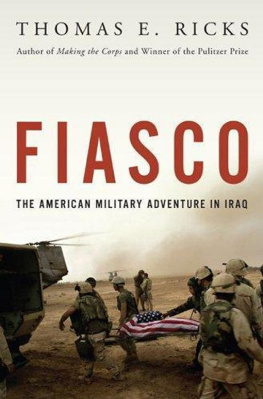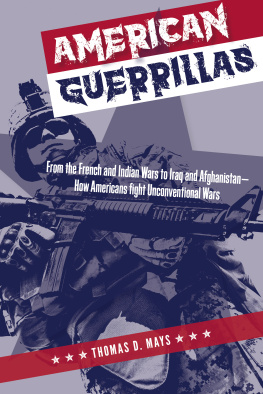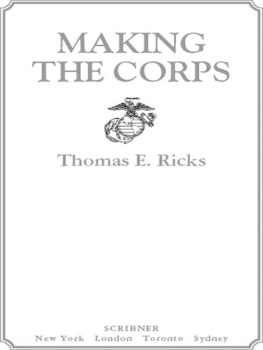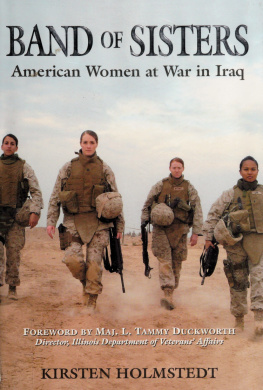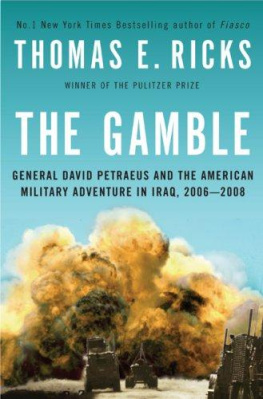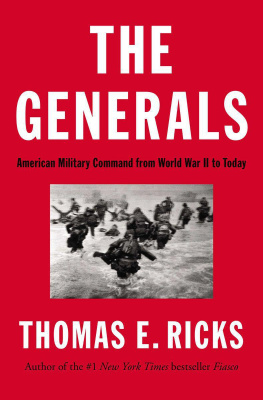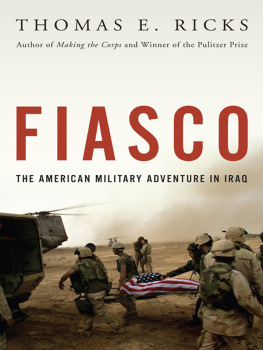Thomas Ricks - Fiasco, The American Military Adventure in Iraq
Here you can read online Thomas Ricks - Fiasco, The American Military Adventure in Iraq full text of the book (entire story) in english for free. Download pdf and epub, get meaning, cover and reviews about this ebook. year: 2006, publisher: The Penguin Press HC, genre: History. Description of the work, (preface) as well as reviews are available. Best literature library LitArk.com created for fans of good reading and offers a wide selection of genres:
Romance novel
Science fiction
Adventure
Detective
Science
History
Home and family
Prose
Art
Politics
Computer
Non-fiction
Religion
Business
Children
Humor
Choose a favorite category and find really read worthwhile books. Enjoy immersion in the world of imagination, feel the emotions of the characters or learn something new for yourself, make an fascinating discovery.
- Book:Fiasco, The American Military Adventure in Iraq
- Author:
- Publisher:The Penguin Press HC
- Genre:
- Year:2006
- Rating:4 / 5
- Favourites:Add to favourites
- Your mark:
- 80
- 1
- 2
- 3
- 4
- 5
Fiasco, The American Military Adventure in Iraq: summary, description and annotation
We offer to read an annotation, description, summary or preface (depends on what the author of the book "Fiasco, The American Military Adventure in Iraq" wrote himself). If you haven't found the necessary information about the book — write in the comments, we will try to find it.
Fiasco, The American Military Adventure in Iraq — read online for free the complete book (whole text) full work
Below is the text of the book, divided by pages. System saving the place of the last page read, allows you to conveniently read the book "Fiasco, The American Military Adventure in Iraq" online for free, without having to search again every time where you left off. Put a bookmark, and you can go to the page where you finished reading at any time.
Font size:
Interval:
Bookmark:

FIASCO
THE AMERICAN MILITARY ADVENTURE IN IRAQ
THOMAS E. RICKS
For the war dead
Know your enemy, know yourself, One hundred battles, one hundred victories.
Sun Tzu , ancient Chinese military strategist, as quoted in Jeffrey Race's War Comes to Long An
The Sunni "Triangle": Heart of the Insurgency


CAST OF CHARACTERS
THE BUSH ADMINISTRATION (2002-4)
President George W. Bush
Vice President Richard B. Cheney
I. Lewis "Scooter" Libby, Cheney's chief of staff and national security adviser
National Security Adviser Condoleezza Rice
Secretary of State Colin L. Powell
Deputy Secretary of State Richard Armitage
CIA Director George Tenet
AT THE PENTAGON
Defense Secretary Donald Rumsfeld Deputy Defense Secretary Paul Wolfowitz Under Secretary for Policy Douglas Feith Lawrence Di Rita, chief Pentagon spokesman Air Force Gen. Richard Myers, chairman of the Joint Chiefs of Staff Army Lt. Gen. George Casey, director of the Joint Staff; later replaced Sanchez in Iraq
Marine Lt. Gen. Gregory Newbold, director of operations, the Joint Staff
Gen. Eric Shinseki, chief of staff of the U.S. Army
Richard Perle, chairman, Defense Policy Board
Ret. Marine Col. Gary Anderson, consultant to Wolfowitz
U.S. CENTRAL COMMAND (2003-4)
Army Gen. Tommy R. Franks, commander; retired mid-2003
Army Lt. Gen. John Abizaid, deputy commander; promoted to replace Franks
Air Force Maj. Gen. Victor Renuart, director of operations
Army Col. John Agoglia, deputy chief of plans
Gregory Hooker, senior intelligence analyst for Iraq
Army Lt. Gen. David McKiernan, commander, Coalition Forces Land Component
Command (CFLCC), the ground component of the invasion force Army Col. Kevin Benson, chief planner at CFLCC
IN IRAQ_(2003-4)
Ret. Army Lt. Gen. Jay Garner, chief of the Office of Reconstruction and Humanitarian Assistance, first senior U.S. civilian official in IraqCoalition Provisional Authority
Amb. L. Paul "Jerry" Bremer III, chief, Coalition Provisional Authority;
replaced Garner Ret. Army Lt. Gen. Joseph Kellogg, Jr., deputy to Bremer Army Col. Paul Hughes, strategic adviser Maj. Gen. Paul Eaton, first chief of training for Iraqi army Marine Col. T. X. Hammes, staff, Iraqi security forces training program Keith Mines, CPA representative in al Anbar province
Military
Army Lt. Gen. Ricardo Sanchez, senior U.S. commander
Army Brig. Gen. Barbara Fast, senior intelligence officer for Sanchez
Ret. Army Col. Stuart Herrington, consultant to Fast
Army Maj. Gen. David Petraeus, commander, 101st Airborne Division,
later returned to oversee the training of Iraqi forces Col. Joe Anderson, a brigade commander in the 101st Airborne Maj. Isaiah Wilson, first served as an Army historian,
later as strategist for Petraeus Army Maj. Gen. Charles Swannack, Jr., commander, 82nd Airborne Division Col. Arnold Bray, commander of a brigade of the 82nd Airborne Army Maj. Gen. Raymond Odierno, commander, 4th Infantry Division Army Col. David Hogg, a brigade commander in 4th ID Army Lt. Col. Christopher Holshek, commander of a civil affairs unit
attached to Hogg's brigade Army Lt. Col. Steve Russell, commander of an infantry battalion in the 4th ID Army Lt. Col. Nathan Sassaman, another of Odierno's battalion commanders Army Lt. Col. Allen West, commander of a 4th ID artillery battalion Army Lt. Col. David Poirier, commander of MP battalion attached to 4th ID Army Col. Teddy Spain, commander of U.S. military police forces in Baghdad Army Capt. Lesley Kipling, communications officer on Spain's staff Army Brig. Gen. Martin Dempsey, commander, 1st Armored Division Army Brig. Gen. Janis Karpinski, commander of U.S. military detention
operationsArmy Col. David Teeples, commander, 3rd Armored Cavalry Regiment Maj. Gen. James Mattis, commander, 1st Marine Division Army Col. Alan King, civil affairs officer, 3rd Infantry Division; later a tribal affairs specialist at CPA
Other
David Kay, head, Iraq Survey Group, U.S. government organization searching
for weapons of mass destruction Ahmed Chalabi, leader of the Iraqi National Congress, an exile political group
IN IRAQ_(2004 AND LATER)
Civilian
Amb. John Negroponte, replaced Bremer Amb. Zalmay Khalilzad, replaced Negroponte
Military
Gen. Casey, promoted and replaced Sanchez
Kalev Sepp, adviser to Casey on counterinsurgency
Army Maj. Gen. John Batiste, commander 1st Infantry Division
Army Capt. Oscar Estrada, civil affairs officer attached to 1st ID in Baqubah
Army Col. H. R. McMaster, commander, 3rd Armored Cavalry Regiment
Col. Clarke Lethin, chief of operations, 1st Mari ne Division
Col. John Toolan, commander, 1st Marine Regiment
Others appearing frequently
Retired Marine Gen. Anthony Zinni, former chief, U.S. Central Command Rep. Ike Skelton of Missouri, senior Democrat, House Armed Services Committee
Patrick Clawson, deputy director, Washington Institute for Near East Policy
Judith Miller, national security reporter, New York Times
Grand Ayatollah Ali Sistani, Shiite leader and Iraq's most important
political figure Moqtadr al-Sadr, nationalist Shiite cleric
PART I - CONTAINMENT
A BAD ENDING
SPRING 1991
President George W. Bush's decision to invade Iraq in 2003 ultimately may come to be seen as one of the most profligate actions in the history of American foreign policy. The consequences of his choice won't be clear for decades, but it already is abundantly apparent in mid-2006 that the U.S. government went to war in Iraq with scant solid international support and on the basis of incorrect informationabout weapons of mass destruction and a supposed nexus between Saddam Hussein and al Qaeda's terrorismand then occupied the country negligently. Thousands of U.S. troops and an untold number of Iraqis have died. Hundreds of billions of dollars have been spent, many of them squandered. Democracy may yet come to Iraq and the region, but so too may civil war or a regional conflagration, which in turn could lead to spiraling oil prices and a global economic shock.
This book's subtitle terms the U.S. effort in Iraq an adventure in the critical sense of adventurismthat is, with the view that the U.S.-led invasion was launched recklessly, with a flawed plan for war and a worse approach to occupation. Spooked by its own false conclusions about the threat, the Bush administration hurried its diplomacy, short-circuited its war planning, and assembled an agonizingly incompetent occupation. None of this was inevitable. It was made possible only through the intellectual acrobatics of simultaneously "worst-casing" the threat presented by Iraq while "best-casing" the subsequent cost and difficulty of occupying the country.
How the U.S. government could launch a preemptive war based on false premises is the subject of the first, relatively short part of this book. Blame must lie foremost with President Bush himself, but his incompetence and arrogance are only part of the story. It takes more than one person to make a mess as big as Iraq. That is, Bush could only take such a careless action because of a series of systemic failures in the American system. Major lapses occurred within the national security bureaucracy, from a weak National Security Council (NSC) to an overweening Pentagon and a confused intelligence apparatus. Larger failures of oversight also occurred in the political system, most notably in Congress, and in the inability of the media to find and present alternate sources of information about Iraq and the threat it did or didn't present to the United States. It is a tragedy in which every major player contributed to the errors, but in which the heroes tend to be anonymous and relatively powerlessthe front-line American soldier doing his best in a difficult situation, the Iraqi civilian trying to care for a family amid chaos and violence. They are the people who pay every day with blood and tears for the failures of high officials and powerful institutions.
Font size:
Interval:
Bookmark:
Similar books «Fiasco, The American Military Adventure in Iraq»
Look at similar books to Fiasco, The American Military Adventure in Iraq. We have selected literature similar in name and meaning in the hope of providing readers with more options to find new, interesting, not yet read works.
Discussion, reviews of the book Fiasco, The American Military Adventure in Iraq and just readers' own opinions. Leave your comments, write what you think about the work, its meaning or the main characters. Specify what exactly you liked and what you didn't like, and why you think so.

